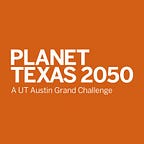Environments and Borders: A “Not Even Past” Collaboration
By Mary Huber
As part of the Institute for Historical Studies’ “Climate in Context” events, Planet Texas 2050 has teamed up with the digital magazine “Not Even Past” to release a series of articles highlighting how history and archaeology are key to our understanding and mitigation of the devastating effects of climate change. “Climate in Context” is a year-long program of talks and workshops that look at how human interaction with the natural world has changed over time and what valuable information that can provide for addressing our current conditions. Here is a look at the third installment of the series, which explores the relationship between environmental and political borders and the unique characteristics that tie together people who live in the Chihuahuan desert.
Borders today are understood as political demarcations that separate states and nation-states. But, sometimes, we share more in common with the people beyond these arbitrary lines than we think. Especially in the early 20th century and before, the natural environment typically helped shape people’s identities at least as much as the political boundaries they were born into.
In Texas, people raised in the Gulf Coast wetlands share a similar environment with their counterparts in Louisiana. East Texans who live in the piney woods experience ecological patterns closer to their neighbors in Arkansas. And in West Texas, the desert ties together inhabitants of Texas, New Mexico and Mexico to the south.
Mexican American and Latino/a Studies Assistant Professor C.J. Alvarez has spent the last three years studying this last group, which he calls “desert dwellers” — people who live in the vast 193,000-square-mile Chihuahuan desert that spans states and national borders. Using oral histories alongside ranch and irrigation records, he has been able to re-create a sense of what life was like for them in the 19th and early 20th centuries and the conditions that helped define them.
In those days, he says, almost everyone who lived in the desert had to directly confront desert conditions in their day-to-day lives. Limited water, extreme heat, difficulty caring for animals, and serious agricultural challenges were all part of the package.
“Despite the fact that drylands are often written off as vacant wastelands, they are in fact some of the most fragile environments on earth,” he says. “Because of this, arid zones will suffer some of the most serious repercussions from climate change, many of which have already begun. Looking back at the history of how people have confronted the extreme conditions of deserts will help us better respond to an uncertain future.”
Read more about Alvarez’s work in this latest collaboration between Planet Texas 2050 and “Not Even Past.”
Please join us on this journey.
Planet Texas 2050 is a research grand challenge at The University of Texas at Austin. We’re a team of more than 150 researchers across all disciplines working together over the next decade to find ways to make our state more resilient in the face of extreme weather events and rapid population growth. Follow us on Twitter, visit our website, and come back to our blog for updates.
C.J. Alvarez, Ph.D., is an assistant professor in the department of Mexican American and Latina/o Studies. He writes and teaches about the history of the U.S.-Mexico border and environmental history. His first book, Border Land, Border Water: A History of Construction on the U.S.-Mexico Divide, about the history of the built world of the U.S.-Mexico borderline, won the Vernacular Architecture Forum’s Abbott Lowell Cummings Award, given annually to the newly-published book that has made the most significant contribution to the study of vernacular architecture and cultural landscapes of North America.
